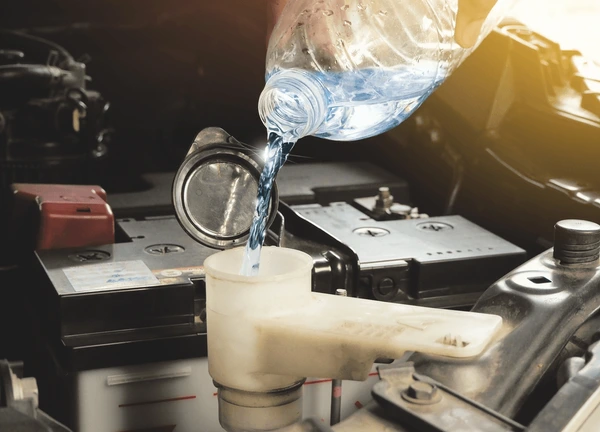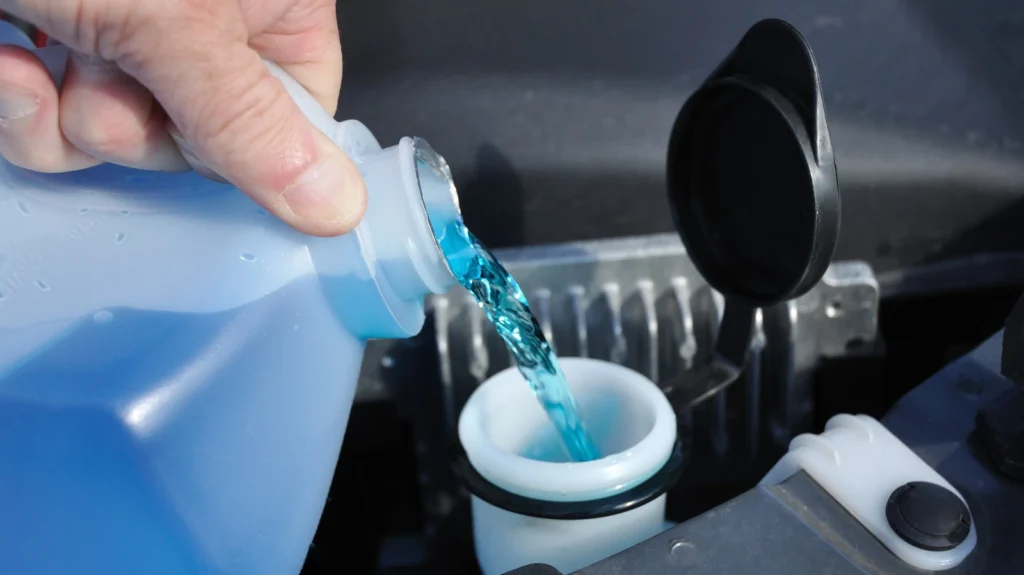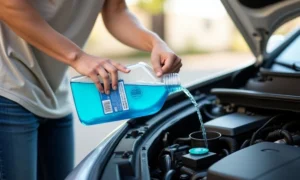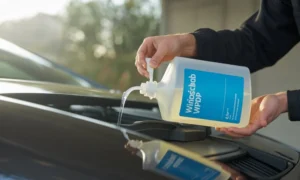How Much Is Car Window Tinting How much is car window tinting? Car window tinting...
Can You Put Water In Windshield Wiper Fluid?
Can you put water in windshield wiper fluid? This is a common question many drivers ask when looking for a quick solution to a low windshield water tank. Windshield wiper fluid, also known as car windscreen washer fluid, plays a vital role in vehicle maintenance by helping to clean the windshield and maintain visibility in various driving conditions. While water might seem like an easy and cost-effective alternative, it’s important to understand the implications before using it.
This article will explore whether or not it’s safe to use water in place of traditional car windscreen washer fluid. We’ll discuss the pros and cons of using water, when it might be acceptable, the potential risks to your vehicle, and how to properly refill the windshield water tank to ensure optimal performance and safety.
What is Windshield Wiper Fluid?
Definition and Purpose of Windshield Wiper Fluid
Windshield wiper fluid, also called car windscreen washer fluid, is a special liquid used in vehicles to clean the windshield. It is stored in a small container under the hood called the windshield water tank. When you press the wiper control, the fluid sprays onto the glass, and the wipers clean off dirt, bugs, or dust. This helps the driver see clearly, which is important for safe driving.
Common Ingredients in Commercial Windshield Washer Fluids
Most commercial car windscreen washer fluids contain a mix of:
- Water – the base ingredient.
- Methanol or ethanol – alcohol that helps the fluid dry quickly and prevents freezing.
- Detergents – to remove dirt, grease, and bugs.
- Dyes and fragrances – to give it color and a clean smell.
Some washer fluids also have extra ingredients like anti-freeze agents for winter or bug removers for summer.
Differences Between Washer Fluid and Plain Water
While you can put plain water in the windshield water tank, it is not the best choice. Here’s why:
- Water can freeze in cold weather, which may damage the tank or the pipes.
- Water doesn’t clean well. It can’t remove oily spots or bugs.
- Washer fluid works better because it contains cleaning agents and anti-freeze chemicals.
In short, using the right car windscreen washer fluid keeps your windshield clean and your driving safe, no matter the weather.
Can You Put Water in Windshield Wiper Fluid?

Yes, you can put water in windshield wiper fluid, but it’s not always the best option. In some situations, using plain water might be acceptable, but it’s important to understand the risks and when it’s safe to do so.
When Is It Okay to Use Water in Windshield Wiper Fluid?
- In an emergency: If you run out of car windscreen washer fluid while driving and need to clear dust or dirt from the windshield, adding water temporarily can help until you get proper washer fluid.
- In warm weather: During hot months when there’s no risk of freezing, using water in the windshield water tank is less risky, though still not ideal.
Why Water Isn’t the Best Choice
- Freezing risk: Water can freeze in cold weather, which can crack the windshield water tank or block the fluid lines.
- Poor cleaning power: Water doesn’t clean grease, bugs, or road grime as well as car windscreen washer fluid.
- Bacteria and algae: Over time, water in the tank can grow bacteria or algae, leading to clogs and smells.
Manufacturer or Legal Guidelines
Most car manufacturers recommend using approved car windscreen washer fluid in the windshield water tank. In some regions, especially in cold climates, using proper washer fluid may be legally required to meet safety standards.
Pros and Cons of Using Water in Windshield Wiper Fluid
Using water in windshield wiper fluid might seem like a simple and cheap solution, but it comes with both advantages and disadvantages. Below is a clear breakdown to help you decide when it might be okay—and when to avoid it.
A. Pros of Using Water in Windshield Wiper Fluid
- Easily Available and Cheap
Water is free or very low-cost and available almost anywhere, making it a convenient option for quick top-ups. - Works in Emergencies
If you run out of car windscreen washer fluid on the road, plain water in the windshield water tank can help clear light dust or dirt until you find proper fluid. - Environmentally Friendlier in Some Cases
Water doesn’t contain chemicals or alcohol, which might make it a greener choice in areas where temperatures are mild and pollution is a concern.
B. Cons of Using Water in Windshield Wiper Fluid
- Lacks Cleaning Agents
Unlike car windscreen washer fluid, water doesn’t contain detergents or solvents, so it struggles to clean bugs, grease, and heavy grime off the windshield. - Freezes in Cold Weather
Water can freeze in the windshield water tank or spray lines during winter, which can crack components or block the system entirely. - Promotes Bacterial Growth
Especially in warm weather, standing water in the tank can lead to algae or bacterial buildup, causing bad smells and clogging the system.
Short Shelf Life and Limited Performance
Water doesn’t store well and may lose any effectiveness it has quickly. It also offers limited cleaning power compared to real car windscreen washer fluid.
How to Refill Windshield Wiper Fluid
Refilling your car windscreen washer fluid is a quick and simple task that helps keep your windshield clean and your driving safe. Here’s a step-by-step guide, along with useful tips for choosing the right fluid and staying safe if you’re using water or homemade alternatives.
Step-by-Step Guide to Refill Windshield Wiper Fluid
- Turn Off the Car
Always make sure your engine is off and the vehicle is parked safely before opening the hood. - Locate the Windshield Water Tank
Open the hood and look for the windshield water tank. It’s usually a translucent plastic container with a cap marked by a windshield wiper icon or words like “Washer Fluid Only.” - Open the Cap Carefully
Lift the cap gently. Some caps are hinged and stay attached, while others might come off completely. - Check the Fluid Level
Before pouring, see if there’s still any fluid inside. If it’s low or empty, you’re ready to refill. - Pour the Washer Fluid
Slowly pour car windscreen washer fluid into the tank using a funnel to avoid spills. Stop when the level reaches near the top, but don’t overfill. - Secure the Cap and Close the Hood
After filling, close the cap tightly and shut the hood securely.
Tips for Choosing the Right Washer Fluid for Your Climate
- Winter (Cold Weather): Use a winter-specific washer fluid with antifreeze to prevent the liquid from freezing in the windshield water tank and lines.
- Summer (Hot Weather): Choose a bug-removing formula that handles insect splatter and road grime.
- All-Season: All-purpose fluids are good for year-round use in moderate climates.
Precautions When Using Homemade or Water-Based Solutions
- Avoid plain water in winter – it can freeze and damage the washer system.
- Add a small amount of rubbing alcohol if you must use water in cold conditions, but be cautious and test in small amounts.
- Keep homemade mixes clean – Always use distilled water to prevent bacteria and mineral buildup.
- Label your mix clearly to avoid confusion and prevent misuse by others.
Why People Choose Water Over Windshield Wiper Fluid

People may choose water over windshield wiper fluid for several reasons, with two primary factors being:
Cost considerations: Water is readily available and inexpensive compared to commercial windshield wiper fluid. Some individuals may opt for water as a cost-saving measure, especially if they believe it can serve the purpose adequately.
Lack of awareness about the importance of proper fluid: Some drivers might not be fully aware of the benefits of using windshield wiper fluid over water. Windshield wiper fluid is designed to effectively clean the windshield, remove dirt, grime, and improve visibility. Those unaware of these advantages may choose water without realizing the potential consequences of using an improper fluid.
Conclusion
Putting water in the windshield wiper fluid reservoir is generally not recommended. Windshield wiper fluid is specifically formulated to clean the windshield effectively, especially in challenging conditions like dirt, bugs, and winter weather. It contains detergents and additives that help break down and remove debris from the windshield. Water, on the other hand, lacks these cleaning agents and may not effectively clear the windshield or prevent freezing in cold temperatures. Feel free to contact us for any type of services or query like can you put water in windshield wiper fluid.
FAQs
Can I Use Water Instead Of Windshield Wiper Fluid?
While water can be used temporarily, it is not recommended as a long-term substitute. Windshield wiper fluid is specially formulated to handle various weather conditions and effectively clean your windshield.
What Happens If I Use Only Water In My Windshield Wiper Fluid Reservoir?
Using only water may not effectively remove dirt, bugs, or road grime. Additionally, water can freeze in cold temperatures, potentially damaging the washer system.
Can I Mix Water With Windshield Wiper Fluid?
It’s generally better to use windshield wiper fluid without diluting it. Mixing water may reduce the fluid’s effectiveness, especially in extreme weather conditions.
What Type Of Windshield Wiper Fluid Should I Use?
It’s recommended to use a windshield wiper fluid specifically designed for cars. These fluids often contain additives to help with cleaning, de-icing, and preventing freezing.
Can I Use Tap Water In My Windshield Wiper Fluid Reservoir?
While tap water is better than no fluid at all, it may contain minerals and impurities that can leave deposits on your windshield or damage the washer system over time. Using distilled water is a better alternative.
What Happens If Windshield Wiper Fluid Freezes?
Regular windshield wiper fluid contains antifreeze agents to prevent freezing. If you use only water, it may freeze in cold weather, leading to potential damage to the fluid reservoir, hoses, and nozzles.
Our Services
Our Latest Blogs
How Do You Unfreeze Windshield Wiper Fluid
How Do You Unfreeze Windshield Wiper Fluid How do you unfreeze windshield wiper fluid during...
How To Refill Windshield Wiper Fluid
How To Refill Windshield Wiper Fluid How to refill windshield wiper fluid is a simple...
What Kind Of Windshield Wipers Do I Need
What Kind Of Windshield Wipers Do I Need What kind of windshield wipers do I...





